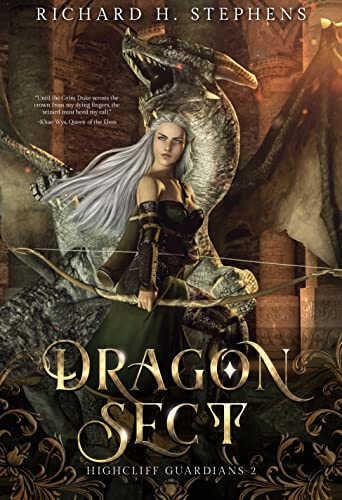Why outline when your characters can show you the way?

When this author sits down to write a novel, he just starts writing and goes where his characters take him. This approach, he insists, saves time and stress, and can even prevent writer’s block.
by Richard H. Stephens
For me, the process of writing a story is an adventure. As a writer of epic fantasy, I am often asked, “How do you world-build? How do you establish plot lines? How do you create characters? How do you build magic systems?” To each and every one of those questions, the answer is simple: I don’t.
 So many people devote countless hours (some take years!) building fantastical worlds. They spend days and weeks fretting over magic systems. They agonize until the sun comes up about plot. I get it. There are a lot of people who require structure. Hey, if that works for them, great, but I don’t have the patience, nor the time, to devote to these things when I could be writing instead. I don’t need to stress over things my characters are going to sort out for themselves anyway.
So many people devote countless hours (some take years!) building fantastical worlds. They spend days and weeks fretting over magic systems. They agonize until the sun comes up about plot. I get it. There are a lot of people who require structure. Hey, if that works for them, great, but I don’t have the patience, nor the time, to devote to these things when I could be writing instead. I don’t need to stress over things my characters are going to sort out for themselves anyway.
What do I mean by that? Well, in some circles, I am called a “pantser.” I had never heard of this term until a few months ago. It means I fly by the seat of my pants. Truth be told, I like to think I fly by the seat of my character’s pants.
When I sit down to write, I haven’t spent weeks agonizing over scene development or crisis management. Heck, I don’t even know what the land looks like around the next bend in the trail. The beauty is I don’t have to. My characters tell me everything I need to know as they experience it.
There are a lot of people who require structure, but I don’t have the patience or time to devote to these things when I could be writing instead.
My world-building consists of maintaining two detailed Excel spreadsheets, which, by the way, are made and added to as the story progresses. Nothing is done beforehand. One spreadsheet, the Places spreadsheet, has a tab for every place—for example, road or river—I put in the story, each with its own description. The other spreadsheet, the People spreadsheet, lists almost every character mentioned (the obligatory “guy that shows up and becomes collateral damage” doesn’t count), with three subcategories: Physical Description, Clothing, and Other.
At some point I generate a map, but not before the story is well underway. Why? Because the characters haven’t told me what’s on the map yet.
And magic systems? Huh? I write fantasy. Magic is an inherent part of the story. I don’t explain how people stay alive by describing the intricacies of breathing: oxygen enters one’s lungs via a tube called an esophagus and then passes through … you get what I’m saying. You just accept the fact that the character’s body is capable of breathing. That being said, I don’t need to explain how magic works. By definition, it’s magic. And with magic, there are costs. Enough said. Get on with the story already!
There are days when the writing process doesn’t flow. Those days are tough. Some people like to hide behind the security curtain many refer to as writer’s block. I refuse to let myself do this. On the days writing doesn’t come naturally, my word count suffers for sure, but I still get a count. I force myself to write the word “the,” and then the next word, and then the one after that. You might surprise yourself. Once you change your mindset from “I can’t do it” to “I am doing it”, more often than not, the so-called writer’s block disappears. Don’t worry if it’s not Pulitzer Prize–winning material—that’s what editing is for!
For me, writing a story is simple. I put a character in a room, or on a trail, or in a boat, and all I need to do is have them place that first foot in front of the other and give them a shove. The rest is easy. The land and their story will evolve before their eyes. My job as a writer is to keep up and tell the reader what my characters are experiencing.
Life is short. Don’t let it pass you by with your characters locked inside your head. If you don’t write it, no one can read it. Sit in front of your keyboard, look through your character’s eyes, and take part in the wondrous adventure awaiting them.
Born in Simcoe, Ontario, in 1965, Richard H. Stephens began writing circa 1974 as a bored child looking for something to while away the long summertime days. His penchant for reading The Hardy Boys led to an inspiration one sweltering summer afternoon when he and his best friend realized, “Hey, we could write one of those.” And so he did. As Richard’s reading horizons broadened, so did his writing. Star Wars inspired him to write a 600-page novel about outer space that caught the attention of a special teacher, Mr. Woodley, who saw his talent and encouraged him to keep writing. A few years later, Richard visited a local bookstore. The proprietor introduced him to Stephen R. Donaldson and Terry Brooks. Richard’s writing life was forever changed.
Visit Richard at his website, and connect with him on Facebook, YouTube, and Amazon.